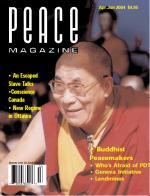
Peace Magazine Apr-Jun 2004, page 28. Some rights reserved.
Search for other articles by Susan McClelland here
Edited by Carol Bergman. Orbis, 2003
Edmonton native Paul Ares didn't see the signs that he was suffering from post traumatic stress disorder (PTSD). In Another Day in Paradise: International Humanitarian Workers Tell Their Stories, Ares describes the initial symptom as a vibration or tremor deep inside his body. He was sure it was the result of a bug he acquired while heading up the World Food Program's operations in West Africa and that a round of antibiotics would cure it. After a year and a half of medication and medical tests confirmed that Ares didn't have a tropical parasite, a UN doctor diagnosed the PTSD.
That was the mid-1990s and the now 56-year-old admits it took a long time for him to accept it was even possible for him to have the illness. He always assumed he could cope with the evil he saw during his two decades as a humanitarian worker. But Ares, who is still plagued by tremors, now recognizes that if there was one assignment that may have affected him more than the others, it was Liberia. He worked there in 1996 during the height of the country's bloody civil war and again in 1999. He was twice taken hostage by rebels; came face to face with the barrels of AK-47s wielded by child soldiers high on drugs; and repeatedly saw his efforts to get food to the starving thwarted. As he writes in Another Day in Paradise, it isn't "necessarily one single incident or event that will take your body to the precipice but rather an accumulation of suppressed feelings, pain, denial and shock."
In Another Day in Paradise, Ares is one of 15 humanitarian workers who recount the horrors and joys they've experienced in the field. Dr. Panaytotis Ellinas writes about being the only doctor to provide medical treatment in a refugee camp housing thousands on the Thai-Cambodian border; Sister Theresa Baldini, 63, and Sister Madeline, 79, talk about their three-decade-long work in Sudan; and Paul Heslop illustrates the physical and emotional toll of defusing land mines in Angola. These are just a few of the people who are on the front lines of war zones and natural disasters and remain there long after the soldiers have gone.
It's a profession, many admit, that, at first, enticed them for its romantic appeal: the promise, for instance, of travels to foreign lands. But as seen most recently with the deaths of aid workers in Iraq and missions being targeted by suicide bombers, humanitarian work is an occupation increasingly fraught with danger. While much has been made in the past few years about the impact of war and unrest on soldiers and civilians, very little is known about how humanitarian workers cope.
Another Day in Paradise offers a rare glimpse into the lives of this small band of people whose sole aim is to alleviate the suffering, even though they often know it is only possible in the short term. Some of the stories provide little insight into why they put themselves in this position - other than, as one writer says, the adrenalin it offers, just as war is a stimulant for some soldiers and journalists. But it is the small rewards, explains Maria Blacque-Belair, an aid worker in Bosnia from 1992-1996, that draws them back. "I became friendly with the people on the street - an old woman, a young boy - and without these attachments, I don't know how I would have gotten through these four years."

Peace Magazine Apr-Jun 2004, page 28. Some rights reserved.
Search for other articles by Susan McClelland here